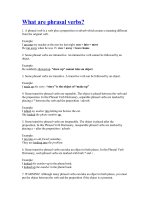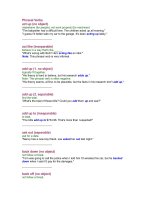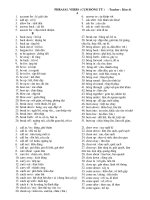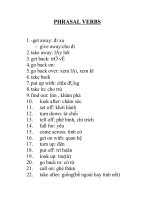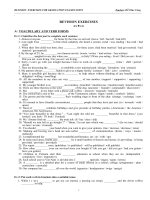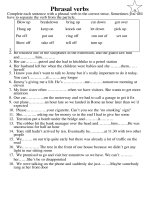PHRASAL VERBS FOR NATIONAL EXAM PREPARATION
Bạn đang xem bản rút gọn của tài liệu. Xem và tải ngay bản đầy đủ của tài liệu tại đây (440.56 KB, 42 trang )
CHUYÊN
ĐỀ
ÔN
THI
THPT
QG
source
of
frustration
for
learners
about
English.
the
difficulties
Many
students
talk
verbs.
Phrasal
verbs
are
widely
used
English
by
but
native
they
speakers
have
been
of
language
learners
to
master
(Moon,
subject
1997;
of
how
Kao,
best
2001).
to
The
controversial.
Although
teaching
of
daunting
phrasal
and
verbs
difficult
has
been
for
for
learners,
itmanner
is
necessary
to
develop
understanding
our
students’
and
using
skills
inaais
frequently
used
by
native
speakers
spoken
English,
both
in
students
written
and
need
“There
is
no
specified
way
or
programmed
student
can
learn
all
in
which
adjectives,
and
idioms.
The
authors
way
to
acquire
observe
such
that
knowledge
the
only
listening”
(Al-Sibai,
2003).
MÔN : TIẾNG ANH
PHRASAL VERBS FOR NATIONAL EXAM
PREPARATION
TABLE OF CONTENTS
A. INTRODUCTION
3
I. Rationale
3
II. Objectives of the study
3
4 - 31
B. DEVELOPMENT
I. Grammatical explanation of phrasal verbs
4-7
8-16
II. Common phrasal verbs
17-25
III. Teaching procedure
26-31
IV. Exercises for selfstudy
C. RESULT OF APPLICATION
32
D. CONCLUSION
33
REFERENCES
34
1
A. INTRODUCTION
I. RATIONALE
Phrasal verbs have been the source of challenges for learners of English. Many students
talk about the difficulties they have using the phrasal verbs. While phrasal verbs are widely used
by native speakers of English, they have been found to be difficult for second language learners.
This may be caused by the following facts: There are lots of them; It’s often difficult to guess its
meaning; One given phrasal verb can have different meanings; Some phrasal verbs can be
seperated while some other can’t ; There are two word phrasal verbs and there are also three word
phrasal verbs.
Phrasal verbs form an integral part of the English language as spoken every day. They also
appear in most writing, except the very formal. Unless you are comfortable with them, you may
find yourself scratching your head and asking questions like, "What does up (or into, or down,
or under) mean in this sentence?". Apart from understanding phrasal verb usage, another reason
you should learn some is so that you sound more fluent and comfortable with the language.
Although teaching phrasal verbs has been daunting and difficult for teachers, and therefore
tedious for learners, it is necessary to develop our students’ skills in understanding and using
them.
Another reason that I choose this topic is that phrasal verbs appear in almost every English
test in general and once for the University Entrance Examination or now National School
Education Examination. In fact, the phrasal verb -related questions account for from 6 to 8 percent
of the total marks of the whole test.
Thus, in this minor study, I want to focus mainly on how to teach English phrasal verbs in
class with the purposes of both helping my students to prepare for the National School Education
Examination and giving them a good chance to practise using English language more fluently in
daily communication.
II. OBJECTIVES OF THE STUDY
The study is designed to obtain the following objectives:
•
•
•
Revise the overview of phrasal verbs
Recommend the way to teach phrasal verbs in class.
Help students to prepare for the National School Education Examination.
2
B. DEVELOPMENT
I. GRAMMATICAL EXPLANATION OF PHRASAL VERBS
A phrasal verb is a phrase or expression that consists of a verb and another word or two,
like this:
get up; hand in; take off; look forward to
• There are some types of phrasal verbs formed from a single-word verb:
•
1. verb + adverb
eg: look up
These phrasal verbs can be:
• transitive (direct object)
• intransitive (no direct object)
Examples of transitive and intransitive Phrasal verbs:
meaning
example sentence
direct
object
put off
postpone
We will have to put off
the
meeting.
turn
down
refuse
They turned down
my offer.
get up
rise from
bed
I don't like to get up.
break
down
stop
working
He was late because his car broke
down.
transitive
intransitiv
e
Separable
When this type of phrasal verb has a direct object, we can usually separate the two parts. For
example, "turn down" is separable. We can say: "turn down my offer" or "turn my offer down".
Example sentences:
They turned
They turned
3
However, if the direct object is a pronoun, we have no choice. We must separate the two parts of
the verb and insert the pronoun. Look at these examples with the verb "switch on". Note that the
last one is impossible:
John sw
John sw
John sw
John sw
Separable or inseparable?
Many dictionaries tell you when a phrasal verb is separable. If a dictionary writes "look
(something) up", you know that the phrasal verb "look up" is separable, and you can say "look
something up" and "look up something". It's a good idea to write "sthg/sby" as appropriate in your
vocabulary book when you learn a new phrasal verb, like this:
• get up
• break down
• break sthg off
turn sthg/sby down
2. verb + preposition
eg: look after
This type of phrasal verb is also called a "prepositional verb".
Because a preposition always has an object, all prepositional verbs have direct objects (if they are
transitive).
Examples of prepositional verbs:
prepositional
verb
meaning
example sentence
believe in
have faith in the
existence of
I believe in
God.
look after
take care of
He is looking after
the dog.
talk about
discuss
Did you talk about
me?
wait for
await
John is waiting for
Mary.
direct object
4
Prepositional verbs cannot be separated. That means that we cannot put the direct object
between the two parts. For example, we must say "look after the baby". We cannot say "look the
baby after":
Who is looking af
Who is looking th
It is a good idea to write "something/somebody" in your vocabulary book when you learn a new
prepositional verb, like this:
• believe in something/somebody
• look after sthg/sby
This reminds you that the verb needs a direct object (and where to place it).
3. verb + adverb + preposition
eg: look forward to
This type of phrasal verb is also called a "phrasal-prepositional verb".
Examples of phrasal-prepositional verbs:
phrasalprepositional verb
meaning
example sentence
get on with
have a friendly
relationship with
He doesn't get on with
his
wife.
put up with
tolerate
I won't put up with
your
attitude
.
look forward to
anticipate with pleasure
I look forward to
seeing
you.
run out of
use up, exhaust
We have run out of
eggs.
direct
object
Because phrasal-prepositional verbs end with a preposition, there is always a direct object. And,
like prepositional verbs, phrasal-prepositional verbs cannot be separated.
Examples:
5
It is a good idea to write "something/somebody" in your vocabulary book when you learn a new
phrasal-prepositional verb, like this:
• get on with somebody
• put up with sthg/sby
• run out of something
This reminds you that the verb needs a direct object (and where to place it).
Summary:
There are 4 types of phrasal verbs:
Type 1: Separable Phrasal Verbs (Transitive)
The object may come after the phrasal verbs or it may separate the two parts:
• You have to do this paint job over.
• You have to do over this paint job.
When the object of the phrasal verbs is a pronoun, the two parts of the phrasal verb must be
separated:
•
You have to do it over.
Type 2: Inseparable Phrasal Verbs (Transitive)
The parts of these phrasal verb cannot be separated. The objects always come after the phrasal
verbs:
•
"Who will look after my estate when I'm gone?"
Type 3: Intransitive Phrasal Verbs
These phrasal verbs are not followed by an object:
•
"Once you leave home, you can never really go back again."
6
Type 4: Three-Word Phrasal Verbs (Transitive)
These phrasal verbs are made up of three parts:
•
"My brother dropped out of school before he could graduate."
II. COMMON PHRASAL VERBS
These are lists of common phrasal verbs most of which are used in English course books. They
are also useful for preparing for the National School Education Examination
Separable Phrasal Verbs ( Transitive)
No
Verb
1
blow up
explode
The terrorists tried to blow up the railroad station.
bring up
mention a topic
My mother brought up that little matter of my prison
record again.
3
bring up
raise children
It isn't easy to bring up children nowadays.
4
call off
cancel
They called off this afternoon's meeting
5
do over
repeat a job
Do this homework over.
6
fill out
complete a form
Fill out this application form and mail it in.
7
fill up
fill to capacity
She filled up the grocery cart with free food.
find out
discover
My sister found out that her husband had been
planning a surprise party for her.
2
8
Meaning
Example
7
9
10
11
12
13
14
15
give away
give something to
someone else for free
The filling station was giving away free gas.
give back
return an object
My brother borrowed my car. I have a feeling he's
not about to give it back.
hand in
submit something
(assignment)
The students handed in their papers and left the
room.
hang up
put something on
hook or receiver
She hung up the phone before she hung up her
clothes.
hold up
delay
I hate to hold up the meeting, but I have to go to the
bathroom.
hold up
(2)
rob
Three masked gunmen held up the Security Bank this
afternoon.
leave out
omit
You left out the part about the police chase down
Asylum Avenue.
look over
examine, check
The lawyers looked over the papers carefully before
questioning the witness.
(They looked them over carefully.)
look up
search in a list
You've misspelled this word again. You'd
better look it up.
make up
invent a story or lie
She knew she was in trouble, so she made up a story
about going to the movies with her friends.
make out
hear, understand
He was so far away, we really couldn't make
out what he was saying.
pick out
choose
There were three men in the line-up. She picked
out the guy she thought had stolen her purse.
pick up
lift something off
something else
The crane picked up the entire house. (Watch
them pick it up.)
point out
call attention to
As we drove through Paris, Francoise pointed out the
major historical sites.
put away
save or store
We put away money for our retirement. She put
away the cereal boxes.
put off
postpone
We asked the boss to put off the meeting until
tomorrow. (Please put it off for another day.)
16
17
18
19
20
21
22
23
24
8
25
put on
put clothing on the
body
I put on a sweater and a jacket.
(I put them on quickly.)
put out
extinguish
The firefighters put out the house fire before it could
spread. (They put it out quickly.)
read over
peruse
I read over the homework, but couldn't make any
sense of it.
set up
to arrange, begin
My wife set up the living room exactly the way she
wanted it. She set it up.
take down
make a written note
These are your instructions. Write them down before
you forget.
take off
remove clothing
It was so hot that I had to take off my shirt.
talk over
discuss
We have serious problems here.
Let's talk them over like adults.
throw
away
discard
That's a lot of money! Don't just throw it away.
try on
put clothing on to see
if it fits
She tried on fifteen dresses before she found one she
liked.
try out
test
I tried out four cars before I could find one that
pleased me.
35
turn down
lower volume
Your radio is driving me crazy! Please turn it down.
36
turn down
(2)
reject
He applied for a promotion twice this year, but he
was turned down both times.
turn up
raise the volume
Grandpa couldn't hear, so he turned up his hearing
aid.
turn off
switch off electricity
We turned off the lights before anyone could see us.
turn on
switch on the
electricity
Turn on the CD player so we can dance.
use up
exhaust, use
completely
The gang members used up all the money and went
out to rob some more banks.
26
27
28
29
30
31
32
33
34
37
38
39
40
9
Inseparable Phrasal Verbs (Transitive)
No
Verb
Meaning
Example
1
call on
ask to recite in class
The teacher called on students in the back row.
2
call on
(2)
visit
The old minister continued to call on his sick
parishioners.
come
across
find st by chance
3
4
5
6
7
I came across my friend’s lost pen while arranging
my locker.
I am counting on you to submit the assignment by
tomorrow morning.
Count
on
rely on or depend on
something or someone
get
over
recover from sickness or
disappointment
I got over the flu, but I don't know if I'll ever get
over my broken heart.
go over
review
The students went over the material before the
exam. They should have gone over it twice.
go
use up; consume
through
They country went through most of its coal reserves
in one year. Did he go through all his money
already?
8
look
after
take care of
My mother promised to look after my dog while I
was gone.
9
look
into
investigate
The police will look into the possibilities of
embezzlement.
10
run
across
find by chance
I ran across my old roommate at the college
reunion.
11
run
into
meet
Carlos ran into his English professor in the hallway.
settle
on
choose or decide
I thought on which career to take, and I finally
settled on civil engineering.
take
resemble
My second son seems to take after his mother.
12
13
10
after
14
turn
into
Her child turned into a beautiful woman.
become
15
touch
on
mention something
briefly during a
discussion or a speech
The professor touched on the students’ attendance in
the meeting, but he did not go into much detail.
11
Intransitive Phrasal Verbs
No
Verb
Meaning
Example
1
break
down
stop functioning
That old Jeep had a tendency to break down just when I
needed it the most.
catch on
become popular
Popular songs seem to catch on in California first and
then spread eastward.
come
back
return to a place
Father promised that we would never come back to this
horrible place.
come in
enter
They tried to come in through the back door, but it was
locked.
come to
regain
consciousness
He was hit on the head very hard, but after several
minutes, he started to come to again.
come
over
to visit
The children promised to come over, but they never do.
drop by
visit without
appointment
We used to just drop by, but they were never home, so
we stopped doing that.
eat out
dine in a restaurant
When we visited Paris, we loved eating out in the
sidewalk cafes.
get by
survive
Uncle Heine didn't have much money, but he always
seemed to get by without borrowing money from
relatives.
get up
arise
Grandmother tried to get up, but the couch was too low,
and she couldn't make it on her own.
go back
return to a place
It's hard to imagine that we will ever go back to
Lithuania.
go on
continue
He would finish one Dickens novel and then just go
on to the next.
go on (2)
happen
The cops heard all the noise and stopped to see what
was going on.
14
grow up
get older
Charles grew up to be a lot like his father.
15
keep
away
remain at a
distance
The judge warned the stalker to keep away from his
victim's home.
2
3
4
5
6
7
8
9
10
11
12
13
12
16
17
18
19
20
keep on
(with
gerund)
continue with the
same
He tried to keep on singing long after his voice was
ruined.
pass out
lose consciousness,
faint
He had drunk too much; he passed out on the sidewalk
outside the bar.
show off
demonstrate
haughtily
Whenever he sat down at the piano, we knew he was
going to show off.
show up
arrive
Day after day, Efrain showed up for class twenty
minutes late.
wake up
arouse from sleep
I woke up when the rooster crowed.
13
Three-Word Phrasal Verbs (Transitive)
No
Verb
Meaning
Example
1
break in
on
interrupt (a
conversation)
I was talking to Mom on the phone when the
operator broke in on our call.
2
Break up
with
end a romantic
relationship
I think he's going to break up with me.
3
catch up
with
keep abreast
After our month-long trip, it was time to catch up
with the neighbors and the news around town.
4
check up
on
examine,
investigate
The boys promised to check up on the condition of the
summer house from time to time.
come up
with
to contribute
(suggestion,
money)
After years of giving nothing, the old parishioner was
able to come up with a thousand-dollar donation.
6
cut down
on
curtail (expenses)
We tried to cut down on the money we were spending
on entertainment.
7
drop out
of
leave school
I hope none of my students drop out of school this
semester.
8
get along
with
have a good
relationship with
I found it very hard to get along with my brother when
we were young.
9
get away
with
escape blame
Janik cheated on the exam and then tried to get away
with it.
get rid of
eliminate
The citizens tried to get rid of their corrupt mayor in the
recent election.
get
through
with
finish
When will you ever get through with that program?
12
keep up
with
maintain pace with
It's hard to keep up with the Joneses when you lose
your job!
13
look
forward to
anticipate with
pleasure
I always look forward to the beginning of a new
semester.
14
look down
on
despise
It's typical of a jingoistic country that the citizens look
down on their geographical neighbors.
15
look in on
visit (somebody)
We were going to look in on my brother-in-law, but he
5
10
11
14
wasn't home.
16
look out
for
be careful,
anticipate
Good instructors will look out for early signs of failure
in their students
17
look up to
respect
First-graders really look up to their teachers.
18
make sure
of
verify
Make sure of the student's identity before you let him
into the classroom.
19
put up
with
tolerate
The teacher had to put up with a great deal of nonsense
from the new students.
run out of
exhaust supply
The runners ran out of energy before the end of the
race.
21
stand up
for
defend yourself
(verbally)
You should stand up for yourself.
22
take care
of
be responsible for
My oldest sister took care of us younger children after
Mom died.
23
talk back
to
answer impolitely
The star player talked back to the coach and was
thrown off the team.
24
think back
on
recall
I often think back on my childhood with great pleasure.
25
walk out
on
abandon
Her husband walked out on her and their three children.
20
III. TEACHING PROCEDURE
15
This seminar is applied for Grade 12 students in my classes to study for the National Examination
for GCSE within 5 periods
Period 1.
1. GRAMMATICAL EXPLANATION OF PHRASAL VERBS
2. Practice
Decide the type of the phrasal verb in each of sentences below:
1. My parents stood by me when I was arrested for hitting a policeman. (stand by)
2. To be honest, I think he's making it up. I don't think he was attacked. (make up)
3. She's your younger sister. It's normal for her to look up to you. (look up to)
4. I can't hear the music. Can you turn it up? (turn up)
5. Don't worry, she'll be here. You know that she always turns up late. (turn up)
6. Before you see the dentist, please fill in this form with all your details. (fill in )
7. My teacher always used to pick on me at school because I had ginger hair. (pick on)
16
8. Robert, you've said enough. Can you please shut up now! (shut up)
9. He's a nice guy, I get on with him really well. (get on with)
10. Although it's very noisy, I can put up with the noise. It doesn't affect me. (put up with)
11. After my parents died, my grandparents brought me up. (bring up)
12. I stayed up until 3 in the morning to finish this report. (stay up)
Answer:
1. type 2
7. type 2
2. type 1
8. type 3
3. type 4
9. type 4
4. type 1
10. type 4
5. type 3
11. type 1
6. type 1
12. type 3
17
Period 2.
1. Separable Phrasal Verbs
2. Practice: Phrasal verb Cards
18
Period 3.
1. Inseparable Phrasal Verbs
2. Practice: Inseparable phrasal verbs exercises
19
Exercise1. Decide whether the Phrasal verbs are separable or inseparable. Choose the correct
sentences.
1.
get on →
They got on the bus.
They got the bus on.
2.
look up →
Look up the words in a dictionary.
Look the words up in a dictionary.
3.
look after →
Dennis looked after his brother.
Dennis looked his brother after.
4.
turn on →
He turned on the light.
He turned the light on.
5.
ask out →
Henry asked Jenny out.
20
Henry asked out Jenny.
6.
hand in →
Hand in your homework on time.
Hand your homework in on time.
7.
check in →
We checked in at our hotel.
We checked at our hotel in.
8.
mix up →
We mixed up the numbers.
We mixed the numbers up.
9.
give up →
They gave up smoking.
They gave smoking up.
10.
grow up →
He grew up in North Carolina.
21
He grew in North Carolina up.
Answers
1.
turn on → He turned on the light., He turned the light on.
2.
hand in → Hand in your homework on time., Hand your homework in on time.
3.
get on → They got on the bus.
4.
look up → Look up the words in a dictionary., Look the words up in a dictionary.
5.
grow up → He grew up in North Carolina.
6.
check in → We checked in at our hotel.
7.
give up → They gave up smoking., They gave smoking up.
8.
ask out → Henry asked Jenny out., Henry asked out Jenny.
9.
mix up → We mixed up the numbers., We mixed the numbers up.
10.
look after → Dennis looked after his brother.
Exercise 2. Complete the following sentences one of the given adverbs or prepositions
1. He continues to call …………………….. his old colleagues.
at in
on
2. It took me quite some time to get………………………. my breakup with Nancy.
on
over off
3. I need to go ……………………. the documents again before I can arrive at a decision.
out over on
4. He has already gone ……………………. all his money.
over through
after
5. Jane has agreed to look ………………… my baby when I am gone.
Please select 2 correct answers
after at
for
6. The officer said that he would look ………………………. the matter.
into at
after
7. I ran ……………………. an old friend of mine yesterday.
22
across
at
on
8. I ran …………………… Mary at the super market.
into after at
9. I look forward …………………….. hearing from you.
to
for
of
10. I couldn’t believe my eyes when I saw my old boss waiting ……………………. tables.
at
on
with
Answers
1. He continues to call on his old colleagues. (call on = visit)
2. It took me quite some time to get over my breakup with Nancy. (get over = overcome, recover)
3. I need to go over the documents again before I can arrive at a decision. (go over = review)
4. He has already gone through all his money. (go through = use up)
5. Jane has agreed to look after my baby when I am gone. (look after = take care of)
6. The officer said that he would look into the matter. (look into = investigate)
7. I ran across an old friend of mine yesterday. (run across = find by chance)
8. I ran into Mary at the super market. (run into = meet)
9. I look forward to hearing from you. (look forward to = anticipate with pleasure)
10. I couldn’t believe my eyes when I saw my old boss waiting on tables. (wait on = serve)
23
Period 4:
1. Intransitive Phrasal Verbs
2. Practice:
Test your understanding of the Intransitive Phrasal Verbs by answering these questions
1. Could you _______________ later? We haven't talked to each other in ages.
A.drop by
B. go ahead
C. grow up
2. I'm not sure if the new iPhone is _______. It doesn't seem as popular as the older models.
A. dropping by
B. going ahead
C. catching on
3. Could you _______________ a sec? I'm talking to my mom on the other line.
A. move in
B. hold on
C. end up
4. This is a nice place. When did you _______________?
A. die out
B. go ahead
C. move in
5. My car keeps _______________. I'm tired of taking it to the mechanic again and again.
A. catching on
B. ending up
C. breaking down
6. People's interest in Game of Thrones isn't going to _______________ any time soon.
A. end up
B. grow up
C. die out
7. Where did you ____? Your accent is different from most people I know from around here.
A. grow up
24
B. end up
C. die out
8. They ______________ with the building project despite warnings from safety inspectors.
A. ended up
B. went ahead
C. moved in
9. You were living in Laos for a while, weren't you? When did you _______________?
A. grow up
B. get back
C. hold on
10. We _______________ having dinner at the new Japanese place downtown.
A. ended up
B. dropped by
C. caught on
11. She should be here by now. When is she going to _______________?
A. take off
B. show up
C. watch out
12. Get to bed so we can _______________ early in the morning.
A. set off
B. slow down
C. speak out
13. You're going too fast. You need to _______________.
A. slow in
B. slow up
C. slow down
14. If you don't _______________, no one will.
A. speak in
B. speak out
C. speak around
15. Our plane _______________ in two hours.
A. takes off
B. takes up
C. takes in
16. I tried making beef stew for the first time. It didn't _______________ well.
A. turn out
B. turn in
C. turn off
17. I was so tired that I got home and just _______________.
A. passed in
B. passed on
C. passed out
18. I don't trust him. You should _______________.
C. watch off
25

